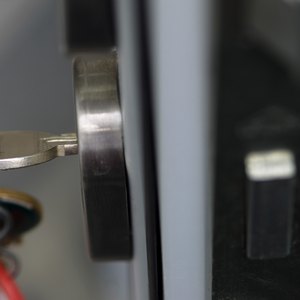
Laws about changing a rental unit’s locks are often complex and vary between jurisdictions. In most states, landlords cannot change locks on a renter’s property until after an eviction or the tenant moves out voluntarily. The right of a tenant to change the locks on her doors depends on state and local law, as well as the terms of the tenant’s lease. Landlords and tenants who are unsure about their rights should contact a lawyer for advice.
Tenant's Right to Security
Most states guarantee a tenant’s right to live in a habitable home. This means that the rental unit should meet minimum health and safety standards, which includes doors that lock securely. If a tenant’s locks are no longer working, he should first contact the landlord to arrange for new locks. If the landlord does not respond, the tenant should check his lease as well as applicable landlord-tenant laws. The tenant may have the right to change the locks on his own or to hire a locksmith and then request reimbursement from the landlord.
Landlord's Right to Access Rental Unit
While tenants have a right to privacy in their homes, this right is not absolute. State laws and local ordinances provide for a landlord’s right to enter a rental home to make repairs or to investigate a suspected emergency, such as burst pipes. This means that if a tenant changes his locks, he should provide a set of keys to his landlord.
Illegal Eviction Tactics
Locking a tenant out of his or her home as a method of “self-help” eviction is illegal in most states. Landlords who believe they have the right to evict a tenant should do so by following state law and asking a judge to issue an order of eviction. Even in places like Texas, where changing the lock on a tenant can be legal, the law does not regard the lockout as a permanent eviction method. Instead, a Texas lockout is designed to force a tenant who is late on rent to communicate with the landlord, who must provide the tenant with a key to the new lock upon request.
Changing Locks at Time of Legal Eviction
Landlords who plan to evict a tenant should make arrangements to have a locksmith present when the sheriff's deputy or other law enforcement officer arrives to enforce the eviction. There are two reasons for this: First, changing the locks prevents the former tenant from entering the home after the deputy leaves. Second, some tenants have been known to change locks before an eviction to make it difficult for the deputy to enforce the eviction order. A locksmith can disassemble the lock so that the deputy can escort the tenant from the premises.
References
- Texas Law Help: Tenant Lock-Outs
- Nolo: Don't Lock Out or Freeze Out a Tenant -- It's Illegal
- Nolo: Can I Sue My Landlord for Changing My Locks And Throwing Away My Possessions?
- Nolo: Tenant Options if Your Landlord Won't Make Major Repairs
- Texas Tenant Advisor: Locks and Security
- New York Times: Can a Landlord Remove a Tenant’s Door Lock?
- Alameda County Sheriff: Civil Unit: Eviction
- Nolo: Entry by the Landlord to Rental Property
- Joint Center for Housing Studies at Harvard University. "America's Rental Housing 2020," Page 9. Accessed March 20, 2020.
- Nolo. "State Laws on Landlord's Access to Rental Property." Accessed March 20, 2020.
- Nolo. "How Evictions Work: Rules for Landlords and Property Managers." Accessed March 20, 2020.
- U.S. Department of Housing and Urban Development. "Housing Discrimination Under the Fair Housing Act." Accessed March 20, 2020.
Writer Bio
Lainie Petersen writes about business, real estate and personal finance, drawing on 25 years experience in publishing and education. Petersen's work appears in Money Crashers, Selling to the Masses, and in Walmart News Now, a blog for Walmart suppliers. She holds a master's degree in library science from Dominican University.

